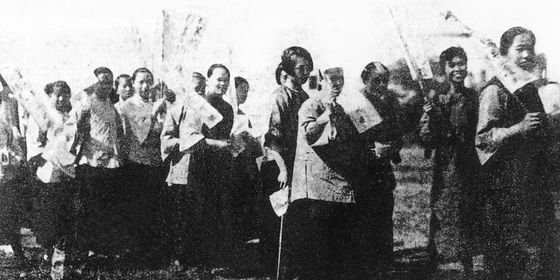Some strange ways people have tried to learn from Lei Feng
On March 5, 1963, Chairman Mao decreed in famous calligraphy that “We should all learn from Comrade Lei Feng.” Currently, this day is an annual opportunity for Chinese schools to organize mandatory community service and “armband volunteers” to show off their skills in honor of the martyred foot soldier.
Not everyone agrees on what it means to “Learn from Lei Feng.” Originally, the famous quote from the soldier’s diary, “I want to be a bolt that never rusts,” was held up during the Cultural Revolution as an example of total dedication to Mao Zedong Thought. After Lei’s untimely death in 1962, Premier Zhou Enlai eulogized, “Learn from Comrade Lei Feng’s clear class position…collective communist spirit, selfless proletarian moral.” President Hu Jintao, however, used a less overtly political version in 2007: “Lei Feng spirit is the spirit of communism, the spirit of wholeheartedly serving the people, loving the Party, loving the country, loving socialism.”
The public have sometimes put unique spins on the what it means to learn from the deceased hero, as shown by the examples below:
1. Lei Feng surgery
In 2015, Zhang Yidong, resident of Anhui province, attracted derision from netizens when media reported that he’d undergone three plastic surgeries to look like Lei Feng. In the ensuing controversy, it was revealed that Zhang has been using his new image in internet fundraising campaigns since 2013, efforts that netizens deemed to be publicity stunts. Zhang’s habit of posting photos of himself in Lei garb, carrying disabled people on his back—and demanding media outlet let him re-post requests they get from the needy on his own Weibo page—are polarizing, as is one stunt involving him begging at the office of China’s attention-grabber-in-chief, Chen Guangbiao (see #3).
Zhang, though, has responded that all the money he raises actually go to help people, which is more than any of his critics can say they’ve done.
2. Help society, forget family
Henan’s Sun Dequn, an unemployed man living in Zhengzhou, seemed to embody Lei Feng’s spirit. For over 20 years, he drove a tricycle called the “Lei Feng-mobile” around town to collect winter coats and duvets for the needy. China Youth Daily, however, accused Sun of neglecting his real family, leaving two children to be raised by his wife in their hometown in order to do good deeds in the provincial capital. They also portrayed his unemployment unsympathetically, stating he was “fired numerous times” from jobs. Other media, though, have spoken admiringly of his commitment to philanthropy in spite of personal struggles.
3. Chen Lei Feng
Chen Guangbiao, the self-proclaimed “Most Prominent Philanthropist of China,” is no stranger to controversial charity. It was only a matter of time before the man who offered free lunch and 300 USD each to 1,000 of New York’s homeless, and handed out cans of fresh air to Beijing residents, decided to tie up his activities with the selfless socialist icon. On July 1, 2014, Chen visited (with photographers present) Lei Feng’s tomb to kowtow three times, and offered his role model a copy of the New York Times report on his project with the American homeless. He has also dressed up in Lei Feng garb (with photographers present) and stated “the biggest difference between myself and Lei Feng is the lack of an inscription by Chairman Mao.”
4. Lei Feng learning leads to arrest
In 2013, a young tourist in Wuhan was detained by police for over-enthusiastic Lei Feng learning—seeing an old woman injured and bleeding in the street, she tried to stop a few police cars to get help. When one slowed down, she kicked the door, and was promptly taken into custody. The woman stated she had kicked the car out of frustration that nobody was helping. While violence certainly isn’t the answer, the incident suggests that a better system to help bystanders take action might be more effective than just having everyone copy a revolutionary hero.
5. Lei Feng swag
Of course, it’s not a holiday in China without rampant commercialism. Authentic “red memorabilia” in China has been reported to be appreciating in market value by as much as 30 percent per year, and cheap replicas are ubiquitous at souvenir shops and tourists sites frequented by millennials.












